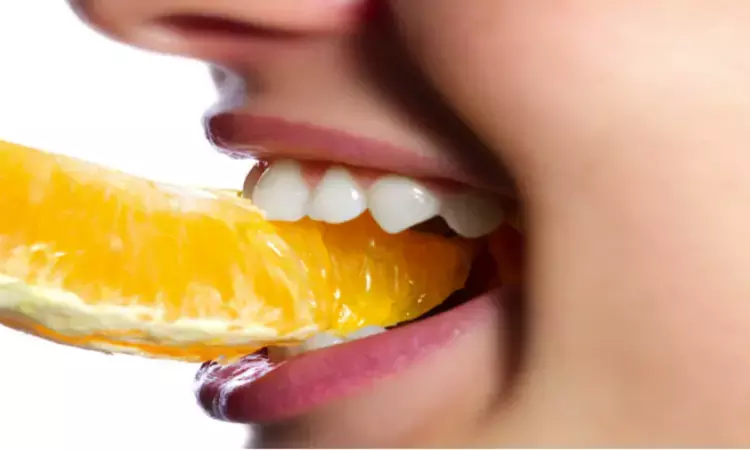- Home
- Medical news & Guidelines
- Anesthesiology
- Cardiology and CTVS
- Critical Care
- Dentistry
- Dermatology
- Diabetes and Endocrinology
- ENT
- Gastroenterology
- Medicine
- Nephrology
- Neurology
- Obstretics-Gynaecology
- Oncology
- Ophthalmology
- Orthopaedics
- Pediatrics-Neonatology
- Psychiatry
- Pulmonology
- Radiology
- Surgery
- Urology
- Laboratory Medicine
- Diet
- Nursing
- Paramedical
- Physiotherapy
- Health news
- Fact Check
- Bone Health Fact Check
- Brain Health Fact Check
- Cancer Related Fact Check
- Child Care Fact Check
- Dental and oral health fact check
- Diabetes and metabolic health fact check
- Diet and Nutrition Fact Check
- Eye and ENT Care Fact Check
- Fitness fact check
- Gut health fact check
- Heart health fact check
- Kidney health fact check
- Medical education fact check
- Men's health fact check
- Respiratory fact check
- Skin and hair care fact check
- Vaccine and Immunization fact check
- Women's health fact check
- AYUSH
- State News
- Andaman and Nicobar Islands
- Andhra Pradesh
- Arunachal Pradesh
- Assam
- Bihar
- Chandigarh
- Chattisgarh
- Dadra and Nagar Haveli
- Daman and Diu
- Delhi
- Goa
- Gujarat
- Haryana
- Himachal Pradesh
- Jammu & Kashmir
- Jharkhand
- Karnataka
- Kerala
- Ladakh
- Lakshadweep
- Madhya Pradesh
- Maharashtra
- Manipur
- Meghalaya
- Mizoram
- Nagaland
- Odisha
- Puducherry
- Punjab
- Rajasthan
- Sikkim
- Tamil Nadu
- Telangana
- Tripura
- Uttar Pradesh
- Uttrakhand
- West Bengal
- Medical Education
- Industry
Dietary acid intake and intrinsic acid exposure not linked to erosive tooth wear progression

Dietary acid intake and intrinsic acid exposure not associated with erosive tooth wear progression, according to a recent study published in the Journal of dentistry.
The aim of this study was to determine predictors of erosive tooth wear (ETW) progression, using novel primary-care quantitative analysis techniques.
In a single-centre, prospective, observational cohort longitudinal study, adolescents, aged 11-18 years, underwent a baseline BEWE examination, validated risk factors questionnaire and baseline intraoral scan (IOS, TRIOS 3.0, 3Shape, Copenhagen, Denmark). One year later a repeat scan was taken. Quantitative analysis of wear progression (volume loss) on first permanent molars and upper central incisors was performed using previously published protocols. Multilevel linear regression was used to investigate the associations between baseline predictors and volume loss per mm2.
Results:
- A total of 295 dental surfaces (131 incisors and 164 molars) in 70 patients were analysed for this study.
- The mean age of participants at baseline was 15.0 years (SD: 0.79), and the average time between scans was 11.8 months (1.61 SD; range 10-13).
- The mean volume loss per mm2 of dental surfaces was -0.013 mm3 (SD: 0.009).
- Greater volume loss was observed among adolescents with higher baseline BEWE scores and those whose parents had lower education as well as on molar than incisor surfaces.
- No associations were found with dietary acid intake and intrinsic acid exposure when baseline levels of tooth wear, parental education and other factors were controlled for.
The findings help to characterise groups at greater risk of ETW and would indicate that improved screening and upstream preventative measures should form the basis of a preventative program. Intra-orals scans and registration software might improve the ability to diagnose, monitor and prevent the early loss of dental hard tissue.
Reference:
Associated risk factors with quantitative erosive tooth wear progression by Francisca Marro et al. published in the Journal of Dentistry.
https://doi.org/10.1016/j.jdent.2022.10417
Dr. Shravani Dali has completed her BDS from Pravara institute of medical sciences, loni. Following which she extensively worked in the healthcare sector for 2+ years. She has been actively involved in writing blogs in field of health and wellness. Currently she is pursuing her Masters of public health-health administration from Tata institute of social sciences. She can be contacted at editorial@medicaldialogues.in.
Dr Kamal Kant Kohli-MBBS, DTCD- a chest specialist with more than 30 years of practice and a flair for writing clinical articles, Dr Kamal Kant Kohli joined Medical Dialogues as a Chief Editor of Medical News. Besides writing articles, as an editor, he proofreads and verifies all the medical content published on Medical Dialogues including those coming from journals, studies,medical conferences,guidelines etc. Email: drkohli@medicaldialogues.in. Contact no. 011-43720751


